
Barga Hazrath Ali
Death condoled Anwarullah Shah Saheb
Date:08/01/2005 URL: http://www.thehindu.com/2005/01/08/stories/2005010814740300.htm
Andhra Pradesh - Hyderabad
Death condoled
HYDERABAD, JAN. 7. The Governor, Sushil Kumar Shinde, has expressed grief at the passing away of Anwarullah Shah Saheb, son of Moulana Khaleelullah Shah Naqshabandi,
here on Thursday. In a condolence message, he said Anwarullah was a popular Sufi saint. "We have lost an affectionate saint committed to the welfare of the poorest of the poor," he said.


Hazrath Syed Abdullah Shah Shab Naqshbandi Mujaddidi Quadery Muhaddith-e- Deccan(R.A):Grand Father of Hazrath Abul Kharat Syed Anwarullah Shah Naqshbandi Qadiri Mujaddidi (R.A) Jaanaseen Sajjadanaseen: Muhaddith-e- Deccan Hazrath Abdul Hasnath,Hazrath Abul Barakat (R.A)
Abul Hasanat Sayyid Abdullah Shah Naqshbandi Qadiri, popularly known as Hadrat Abdullah Shah Sahib, was one of the celeberated scholars of Islam and spiritual reformer. He is more particularly known as a Muhaddith (one who specializes in Hadith literature) ,honorifically as Muhaddith-e Dakkan ( the Muhaddith of the Dakkan) in the Islamic Circles of knowledge all over the world. A prolific writer of Islamic Sciences, he wrote extensively on Fiqh (Islamic Jurisprudence) and compiled
his best-known work Zujajat al-Masabih in five-volumes. A unique and comprehensive collection of Hadiths pertaining to the Hanafi School of Law, the book is considered a magnum opus in Hadith and Fiqh literature. An erudite Mufassir (Qur'anic exegite) and expounder of other Islamic religious texts, he was more importantly one of the most celebrated Sufis produced by India in the 20th century. He is popularly considered to be one of the Saint scholars among the masses of South India, particularly, Hyderabad.
 Photo: Hazrath Abulkharats Namaz-E-Janaza At Makka Masjid
Photo: Hazrath Abulkharats Namaz-E-Janaza At Makka MasjidMoulana Abul Barakat Syed Khaleelullah Shah Naqshbani Mujiaddidi Quadery and His Son Moulana Abul Kharath Syed Anwarullah shah Naqshbandi Mujaddidi Quadery
Birth
The Shaykh was born in Husaini 'Alam, Hyderabad, on 10th of Dhu'l Hijjah, 1292(A.H) or 6th of February 1872 (A.D). His father was Mawlana Sayyid Muzaffar Husain Ibn Sayyid Yaqub of Naldrug. Since the migration of his ancestor, Hazrat Sayyid Ali, this family has been the recipient of land grant from Adil Shah I, the ruler of Bijapur. The daughter of Hazrat Gul Badshah was his mother
Education
In keeping with the traditions of the then society, this young sufi didn't attend any formal school for his education and training. He received his elementary education and lessons in Persian from his father; Logic and philosophy from Mawlana Mansur Ali Khan; the Qur'anic sciences and other subjects from Shaykh al-Islam Hafiz Anwarulla Khan Faruqi, the founder of Jamia Nizamia, jurisprudence from Mawlana Habibur Rahman Saharanpuri, and the science of Hadith and literature from Mawlana Hakim Abdur Rahman Saharanpuri.
Teaching
Even while a student, he started teaching, in both formal and non-formal ways. At times this was in the form of adult education. Most of his audience consisted of elite and common people. He began his teaching career at the mosque named Ali Aqa at Husaini Alam, Hyderabad, and continued it uninterrupted till his last breath.
The well known Syrian scholar Shaykh Abdul Fattah visited Hyderabad and took ijazahs and asnad from Shaykh al-Allamah Abul Hasanat Abdullah Shah.
His Tasawuf
At first he became the disciple of Hadrat Miskin Shah a famous Sufi of Hyderabad, India. Later, on the death of the latter, he approached Hadrat Sayyid Muhammad Badshah Bukhari, popularly known as Bukhari Shah Sahib, who was a renowned spiritual personality of that time. The latter practiced both the Qadiriyyah and the Naqshbandiyyah Sufi Tariqahs or paths. So long as his spiritual mentor was alive, whatever the climate would be, he would see him on daily basis walking about 4 miles to serve him in his mid-night special ritual prayers, the Tahajjud, assisting his spiritual master in performing the ablution and other prayer rituals. This practice went on for about 20 years until the death of his shaykh, Sayyid Badshah Bukhari. During the life-time of his spiritual master, Hadrat Abdullah Shah did not like to have his own spiritual disciples Murids. The number of disciples Murids in his own life time, however, reached in hundreds and thousands. He consistently followed the Hanafi school of jurisprudence and the practices of his spiritual master by initiating his disciples both in the Qadiriyyah and Naqshbandiya Orders.
Hadrat Abdullah Shah took immense care to adhere to the Sunnah in all his actions, sayings and writings. He was always eager to put into practice the teachings of the Prophet, recorded in the Sunnah.
Daily Schedule
His emotional attachment and sincere commitment to Allah and His Messenger was remarkably evident in all he did. He would spend most of his time in the service of Allah's creations. He would begin his day early in the morning from the Fajr prayer. He would then patiently listen to his disciples. Next he would meet the public and attend to individual grievances till 9 o'clock in the morning. After Ishraq prayers, for breakfast and other personal needs, he would spare a few minutes. From almost 10 A.M to 2 P.M, he would have a separate session for women who either approach him for guidance or spiritual consolation. At 2 P.M he would return to the mosque for midday Zuhr prayer and until late afternoon Asr prayer he would be engaged in giving instructions and individual attention to his disciples, responding to miscellaneous requests for help, and so on. The time between Asr and sunset Maghrib followed by the Awwabin prayers, he would have dinner, attend to the letters addressed to him and dictate letters of advice. At 10 P.M he would go to the mosque for nightfall 'Isha' prayer and return home at around midnight. He would sleep for three hours. From 2 A.M till Fajr prayer he would be busy again with Tahajjud prayers. In short, he would rest for three hours and the rest of the 21 hours he would devote his time to the remembrance of the Lord and His creatures
Prediction of His Own Passing
When his contemporary Shaykh Hadrat Sayyid Muhammad Badshah Husaini departed from this world on 25th of August, Hadrat Abdullah Shah predicted that he too would leave this mortal world in two days. His prediction came true. With his death on 18th of Rabi' al-Thani, 1384 A.H or 1964 A.D, at the age of 92 years, the world lost a great spiritual leader and an eminent scholar. The funeral procession was the largest of its kind in the history of Hyderabad, attended by more than two hundred and fifty thousand people. He is buried in Naqshbandi Chaman, Misri Gunj, Hyderabad.
For any enquiries, please contact :abulkharat@rediff.com , Naqshaband
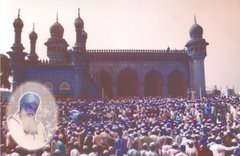

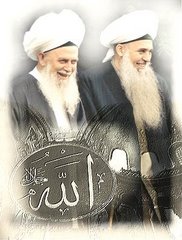

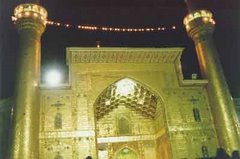

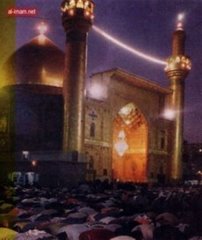

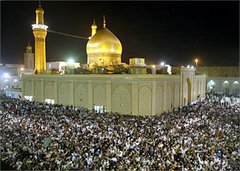




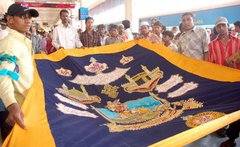
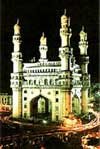



1 comment:
Gulam e Abul Hasanath, Abul Khair Hazrat Abul Gulam Muhammed Asmath Khan Naqshbandi Mujjaddidi Qardi,
lives in 1st Lancer Masabtank Hyderabad Deccan India.
Post a Comment